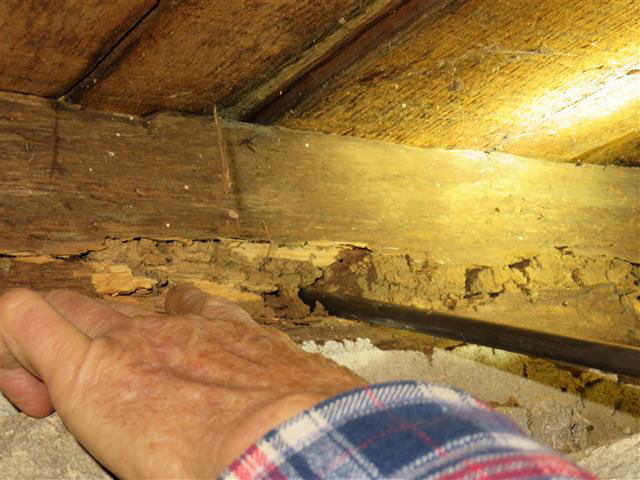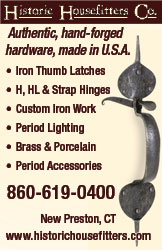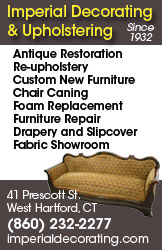Any homeowner is going to be concerned about having termites. Owners of antique homes, however, may have this fear looming larger. With houses built before modern materials, including the treatment of wood with pest-resistant chemicals, owners of Old Homes have cause for concern.
But how justified is that concern and what should you do?
In this segment with Tom Morgan, Member and Master Inspector of Sound Home Inspection, LLC, Tom shares his expertise on Connecticut Old Homes, Termites and what you should really be worried about.
Question: What are termites and what is a “termite infestation”?
Answer: Termites are one of four types of wood destroying insects: termites,carpenter ants, powder post beetles and carpenter bees. The most destructive of the four are termites.
When we have a “termite infestation” it means that termites have come into a house and consumed the wood, which could affect the structural integrity of the building.
Question: How will I know if I have termites?
Answer: As the homeowner, you would know you have termites in one of three ways.
- A home inspection by a qualified inspector would uncover termites.
- In the spring, you may see the insects flying (which we refer to as swarming). They do this when they're moving out of the ground or out of the nest and become airborne
- You may see the byproduct of termites’ activity. Specifically, you would see them sheltered in mud tubes or the destruction of structural wooden members of the house.
Annual inspections can ensure that you observe/treat termites early, before they cause structural (and frequently expensive) damage to your house.
Question: Can I treat them myself?
Answer: Under current state and national regulations, even as the homeowner, you cannot purchase the necessary chemicals which have sufficient strength to eradicate or kill termites.
You need to have a licensed pesticide exterminator who has a license to purchase and apply the chemicals.
Question: What are the treatment options?
Answer: A termite infestation currently can be treated in one of two ways.
One method is what we call a “drill job.” This is where professional exterminatorscome to your home, drill a hole the size of your thumb along the outside of the basement floor and then they inject a chemical via a hose from their truck.
The other method is what we call “bait stations.” This is when professionals put aseries of 2-layered, conical plastic devices in the ground. These containa mixture of sawdust and chemicals.

Question: Are these chemicals dangerous to me, my kids or my pets?
Answer: The toxicity level of these chemicals is rather low.
While the toxicity level is very low, it is recommended not to let your pets or childrenout for the first four or five hours after application.
You will know when the application has taken place, as the lawrequires that a licensed pesticide applier provides notification, usually via small flags, which are placed in the ground around the property.
Question: How long does the treatment last?
Answer: It depends upon which of the two methods of treatment is used.
One is the drill job which, in my opinion, lasts forever.
With the bait station method, these need to be renewed monthly, which involves reinstalling the chemicals and sawdust.
Note: we are not permitted to treat arbitrarily for termites. Once an initial treatment is completedwith the drill job method, should the termites reappear (which is very very seldom), we can only do a local application at the infestation location.
Question: What would happen if I didn’t treat the problem or let an unknown problem continue?
Answer: Very good question. Termites need a water source, such as leaking pipes or a leaking roof. If they have a water source and they're shielded from sunlight via shelter tubes, termites will continue their activity and consume the wood within the house.
If termites were to go uncontrolled, expect major structural damage to the house.
If you have an antique home, you need to stay on top of potential infestations. A specific issue to especially watch for is the failure of “carrying beams”. That is, our CT Old Houses have upright posts with direct contact with the ground. Termites find this 200-year old wood tasty and would try to consume those posts.
So the ultimate effect if termites go untreated is major structural problems,which require significant, lengthy carpentry repairs once the termites are exterminated.
So treat termites immediately and get regular inspections to avoid hidden problems.
Question: How do I find the right person to treat the termites?
Answer: The first requirement is that the termite exterminator must have a license. Sound Home Inspection, LLC, for example, is licensedto perform home inspections in the state of Connecticut and across the New England. So that's the first criteria: Is the termite exterminator licensed?
The second thing is to interview the exterminator. The industry is split between what I call the mom-and-pop/ small operations and the large franchises. Bigger is not necessarily better. The person you speak to at a large company is likely not who will be on your property. As you will likely need annual visits and/or treatments, you want to build a relationship with the person and to benefit from their familiarity with your home, issues and areas to be carefully watched. In addition, the smaller organization will likely note any other potential issues while there and work on a solution, whereas a larger organization could be pushy with sales quotas to sell unnecessary services or make it so difficult to get additional information that you decide to start over with another company.
Question: Are termites the only wood destroying insect I should be concerned about?
Answer: Great question. When we do our inspections and fill out our reports, we're inspecting for all four types of wood destroying insects: termites, carpenter ants, powder post beetles and carpenter bees.
The two most prevalent of these in New England are termites and carpenter ants. These are both destructive and need to be treated. In order to prevent structural damage, Old Homes require annual pest inspections. For those owning a CT Old House, you also need to be paying attention to Powder Post Beetles.
Be sure to check back for Tom Morgan’s next article on Powder Post Beetles where he addresses this serious and overlooked threat to Antique Homes.
Learn more at www.SoundHomeInspections.com. |

 Structural Products & Services, Stairlifts
Structural Products & Services, Stairlifts






